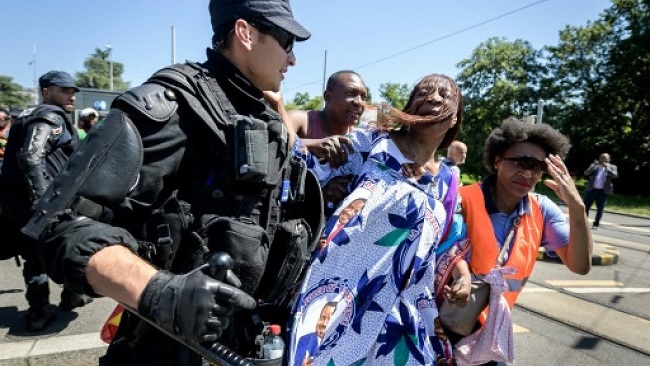The Swiss luxury getaway of president Biya has become a hotbed of conflict
Cameroon’s longtime president Paul Biya’s latest “private visit” to his usual retreat at the Intercontinental Hotel in Geneva has sparked more than its usual mix of political controversy and quiet embarrassment.
Over the last decade, Biya, 86, who has been in power since 1982, has made the top floor suites of the five-star luxury hotel into his home away from home spending months at a time even as his country has slowly descended into conflict from Boko Haram Islamic terrorists in the north of the country and an Anglophone-led insurgency in north- and southwest of the country.
This past weekend Swiss police fired tear gas and water cannons at Cameroonian protesters who clashed with security at the hotel where dozens of Biya’s personal security agents and federal police have stayed on guard in- and outside.

“Not helpful” is how one source close to the diplomatic process described the arrival of Biya just days before a second meeting between factions from the predominantly Anglophone regions was to take place in Saint Luc—some 200 kilometers to the east of Geneva. The International Crisis Group reports that some 1,850 people have been killed and more than half a million left homeless, as an armed separatist movement evolved in response to political and social tensions.
Switzerland’s foreign affairs ministry, together with the Geneva-based Center for Humanitarian Dialogue, are leading the mediation process aimed at putting an end to the deadly conflict which evolved after peaceful protests by English-speaking professionals to structural discrimination in October 2016. Groups in the two western regions of the country want the creation of an independent state called Ambazonia. President Biya has branded separatists as terrorists.
Nfor Hanson Nchanji, a Geneva-based Cameroonian journalist emphasized that parties to the discussion need to communicate with their communities back home for talks to succeed.“The presence of Paul Biya in Switzerland has caused some Ambazonians to reconsider whether Switzerland may be the perfect mediator. But should they refuse the Swiss mediation…they will have nowhere to go.”
The Swiss mediated talks have been supported by United States, the European Union and the United Nations.
Meanwhile some Francophone opponents to Biya’s government, regretted that Maurice Kanto, a rival to Biya in the October 2018 presidential election, who won 14% of votes according to the Constitutional Council, was not included in the talks. The opposition accused the government of having rigged results.
It’s been reported Biya had spent at least 1,645 days abroad on private trips since 1982, with Geneva being his top destination. It estimated it costs Intercontinental Hotel around £40,000 ($50,000) a night for the president and his entourage. “How could Switzerland be trust-worthy in mediating the talks after the way the police treated protesters?” said Toyou.
Meanwhile, Jean Philippe Brandt of Geneva’s police explained that as protesters did not respect the agreed terms for protesting, and left an authorized area accorded for the demonstration, “The use of any accessory or armament was related possibly to the aggression by the protesters and to disobey instructions given by the police.”
The confrontation came just days after a Swiss journalist, Adrien Krause, who was covering Biya’s stay from in front of the Geneva hotel, was attacked. “It is very probable that they were security guards” associated to Biya.







